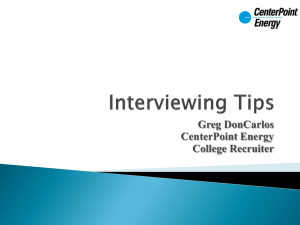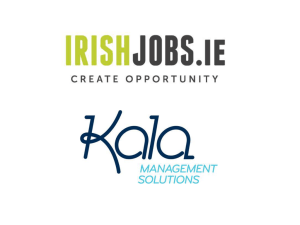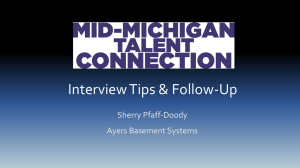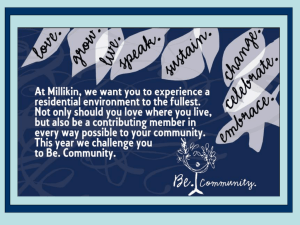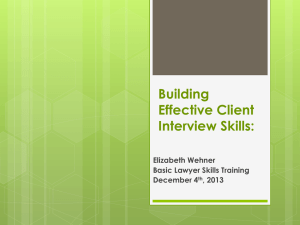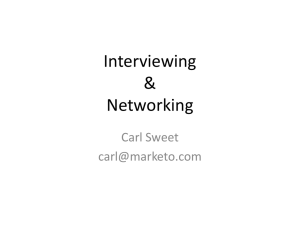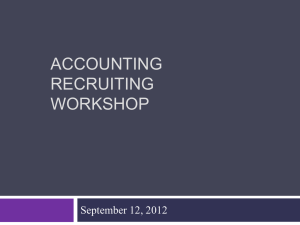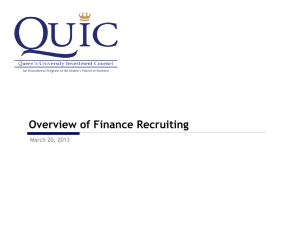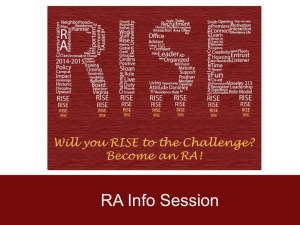Interviewing Questions/Resume Design
advertisement
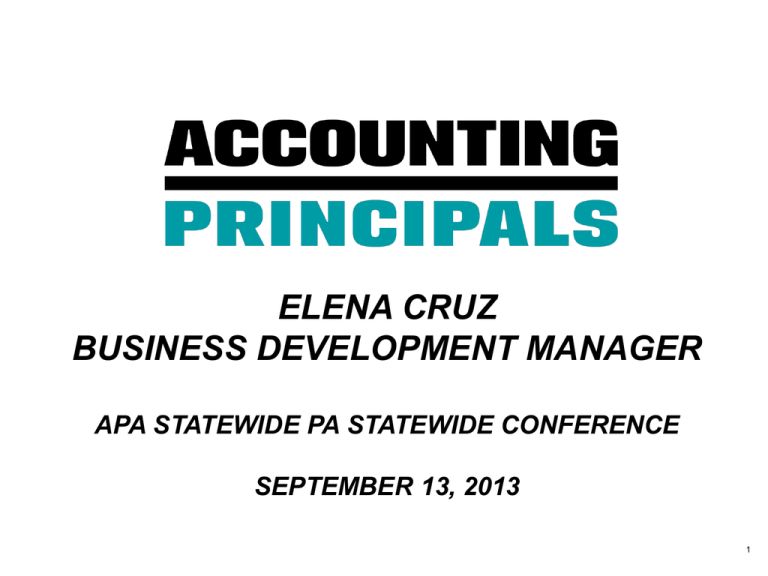
ELENA CRUZ BUSINESS DEVELOPMENT MANAGER APA STATEWIDE PA STATEWIDE CONFERENCE SEPTEMBER 13, 2013 1 Agenda • For job seekers • Find out where to look • Make yourself marketable • Interview prep tips • The salary discussion • Networking • Top positions in accounting and finance • For employers • Identifying your workforce needs • How to find the talent • Tips on conducting a successful interview • Improve your hiring process 2 So what does this mean for you as an… Job seeker? •Learn how to market yourself in today’s economy, from your resume and social media presence to your networking and interview skills. •Educate yourself on where to look for jobs and what to do once you’ve found the one you want. Employer? •Learn how to recruit, retain and inspire your workforce so as to maintain the highest functioning team for the success of your business. It’s becoming increasingly important, in these particular economic times, for employers and those in leadership roles to understand the how and where potential employees are looking for jobs. •It’s important to make sure you nail down the right candidate– and getting the right fit starts even before the interview, with you! 3 Job seeking? Know where to look. Between job boards and LinkedIn, finding the perfect employment can be tough. Make sure to: •Go through the proper platforms: • LinkedIn • Online postings • CareerBuilder • Monster • Indeed •Talk to a recruiter, they’ll have the most inside information on job availability. •Make sure you fit the job description. 4 Stay polished There’s a few things you can do to make sure you’re seen as hirable in today’s highly competitive candidate pool… •Tailor your resume to the position (with the company in mind) •Make sure you pass the “Google test” •Update LinkedIn Profile and reach out to individuals for recommendations. 5 Before an interview • Do a test run and become familiar with traffic patterns and delays. A few questions you should be prepared to answer: • What are your short-term and long-term objectives? • What do you look for in a job? Why did you choose to apply here? • Why should we hire you? • What is your biggest strength? Weakness? • What are the most important rewards you expect in your career? • How long would you stay with us? 6 Before an interview A few things to remember.: The prospective employer will make his or her hiring decision based on these key factors: • Attitude and business poise • Image, presentation and communication skills • Experience and skill set • Education and certifications • Transferable industry and technical background 7 Do your homework On the company: Try these sources for information: • Your recruiter • The internet • Periodicals and trade journals • Annual reports and 10K reports • Friends and business associates On the position: Be prepared to ask questions like: • Who has been successful and why? • Who has failed and why? • Who does the position report to? 8 Do your homework On yourself: Review your career history thoroughly. • Review all dates, positions, responsibilities and accomplishments. • Know your strengths and weaknesses. • Be prepared to cite specific examples of achievements and how these experiences can help the company solve some of its problems. • Concentrate on your most recent positions but make sure to highlight your progress throughout your career. • Reflect on your successes so you can adequately impart your strengths when given the chance. 9 The salary discussion •Most companies want to make a fair offer. •Manage your expectations. •The position is the single most important element of your decision. •Compensation packages are a combination of salary, bonus, titles and perks. These elements can be arranged and rearranged — sometimes very creatively — to satisfy both the individual and the company. 10 The salary discussion •Keep your recruiter involved. Part of our job is to handle sensitive negotiations and move both parties to a fair and acceptable compensation package. •If you are asked directly what salary you are looking for, try to avoid quoting a specific figure. It is best not to name a figure if at all possible. You don’t want to over-or-under price yourself, so remember to discuss all relevant salary and benefits issues with your recruiter 11 Close strong Just as important as making a good first impression is leaving a lasting positive impression. If the interviewer has failed to elicit some important information about you make that information known before you leave. Lastly, always find out what the next steps will be and when they are likely to occur. 12 Follow through by following up Even after you’ve shaken hands and said goodbye, the interview process is not over. •Craft a follow-up letter - Remind the interviewer about your skills. - Communicate anything else you forgot to say - during your discussion. A hard copy letter is preferred but an email is acceptable. Be as brief as possible– it demonstrates respect for the interviewer’s time. 13 Follow through by following up - The body of the letter should accomplish four main objectives: 1. Thanking the interviewer for their time. 2. Reiterating interest and enthusiasm in the company and position. 3. Highlighting your experiences and accomplishments. 4. Asking if you can proceed to the next step. 14 Follow through by following up •Sending the follow-up communication: • Make sure to send the letter as soon as possible. This allows you to convey a sense of urgency and a high interest level in the opportunity. Ideally, your communication should go out the next day. • A follow-up letter is more than a courtesy, it is an imperative. 15 Quick interview tips On the day of, remember to: - Arrive early. Fill out all applications neatly and completely. Bring several copies of your resume. Be enthusiastic about the position and the company. Ask specific questions. Do not discuss salary or benefit packages. Sell your attitude during the interview. Practice makes perfect. Organize your answers. Do not answer questions with a simple “yes” or “no.” 16 Quick interview tips On the day of, remember to: - Stress your achievements and accomplishments. Answer all questions clearly and succinctly. Do not speak negatively about other companies. Always represent yourself honestly. Mitigate your negatives. Answer every question, even the tough ones. Make the job you’re interviewing for your chief objective. 17 Networking your way to the top Networking is an important way to solidify your ties to your professional community– from getting your foot in the door to getting your name on a plaque on that door, networking should be a constant in your career journey. APA (American Payroll Association) Alumni Groups IMA (The Association of Accountants and Financial Professionals in Business) SHRM (Society of Human Resource Management) 18 Looking to hire? 19 Identify your workforce needs To find the right people for your business, you have to examine your current workforce and assess your areas of need. At the same time, you need to look ahead to see when your workload might intensify or when your business may need to expand for the long haul. 20 To find this premium talent, you must… Craft a good job description. •Begin the job description with an overview of your organization. •Highlight the position’s reporting relationship(s) and key responsibilities. •Create a realistic set of qualifications. •Decide on a salary and benefits range. •Decide on a title that will make sense both internally and externally. •Use the final job description to create a condensed version for job announcements on boards and networking sites. •Get a recruiter to help with this process. 21 Post • Job Boards, such as Indeed, CareerBuilder and Monster, are great platforms to garner candidate interest. • Use LinkedIn! LinkedIn is a great way to share jobs and really target those key candidates. Once you have your own profile created, you can post a job at a varying fee-level, depending on how targeted you want your post to be. • Use local media job boards. Though traffic isn’t as high as those of the main job boards, your local news stations ill frequently market their job boards. These are a great way to garner local interest! • Attend networking events. Bring a copy of the job description with you to hand out! 22 Before an interview Make a list of questions you might have to ask/answer. 23 Before an interview Make a list of questions you might have to ask/answer. 24 Do your homework – Read the Resume beforehand •Maximize the time you spend with the candidate. If you spend the duration of the interview going over the resume because you haven’t done so beforehand, you’ll likely miss the opportunity to assess the candidate’s equally important personality traits. •Make notes of topics you’d like to expand upon or ask questions about. •The applicant will most likely do their homework on your company, so you should do your best to come to the interview with all the relevant information regarding the position, the salary and the workplace. •Try to look for any gaps in work history, and dig a little deeper during the interview to find out why. 25 Be consistent Maintain Consistency Throughout the Process: Philosophies about hiring come and go: experience versus raw talent, leaders versus team-players, personality tests and problem-solving scenarios versus traditional resumes and interviews. As with a stock portfolio, your best bet is to diversify. But once you've arrived at a set of questions to ask and qualities to look for, stick to your game plan. Using the same list of questions for all candidates helps create a structure for managing all the information provided in their responses. 26 Be a participant in the interview Not just a conductor. •Be prepared to engage with the candidate– they could come with an arsenal of questions, as well, ready to fire away ambitious inquiries in order to impress you •So try to guide the pace a bit– a good interview should be a free-flowing conversation, not a onesided speech or a jarring question and answer session. •At the end of the interview, make sure to ask the candidate if there’s anything else they’d like you to know about them– give them the chance to brag a little. 27 Be a participant in the interview •If you're looking for leadership: - "Tell me about a time when you accomplished something significant that wouldn't have happened if you hadn't been there to make it happen.” •If you're looking for communication: - "Describe a situation where you persuaded team members to do things your way. What was the effect?” •If you're looking for customer service: - "Tell me about a time when you had to deal with an irate customer." 28 Be a participant in the interview But keep it within the legal parameters. •The interview process is subject to numerous employment laws designed to protect applicants' privacy and ensure them a fair shot in the selection process. You cannot ask questions about religion, national origin, age, height, weight, marital status, disability, or gender unless they represent genuine qualifications essential to the operation of the business. (For example: a church can ask potential ministers about their religious background; a contracting firm can ask if candidates are physically able to perform certain tasks.) 29 Be a participant in the interview But keep it within the legal parameters. •You cannot require the candidate to provide personal information. Keep the job relevance in mind throughout the interview process. If asking about offhours pursuits, say so in an open-ended way, such as, "We’re looking for a well-rounded person. Is that how you'd describe yourself?" 30 Get the right candidate Select interview candidates based on whether they fit the company’s position, culture and personality. •In addition to what you find on a resume, look for characteristics that will align with your company’s cultural needs as well: - Attitude - Dependability - Professionalism - Motivation - Flexibility - Communication Skills - Personality 31 Get the right candidate •However, choose the best person for the job— not your new best friend. - It's human nature to base your opinion about a candidate on the gut feeling you develop during the first three minutes of the interview. It’s important to remember– many of the best employees might not make a great first impression, but their talent reveals itself more and more over time. 32 Money talks A few things to remember when initiating salary discussions: •Make a fair offer. • You want to bring a new employee on board at a salary level that provides incentive to change job and excel, while also remaining consistent with your existing salary structure for the position. •Paint the whole picture. • Compensation packages are a combination of salary, bonus, titles and perks. These elements can be arranged and rearranged – sometimes very creatively– to satisfy both the candidate and your company… so make sure the interviewee knows that! •Talk to a recruiter. • Part of a recruiter’s job is handling sensitive negotiations and moving both parties to a fair and acceptable compensation package– so keep them involved. 33 Questions? Questions? A presentation to Company Name or presentation title Date 00, 2011
